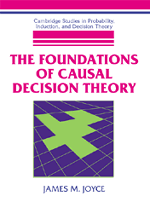Book contents
- Frontmatter
- Contents
- Preface
- Introduction: A Chance to Reconsider
- Chapter 1 Instrumental Rationality as Expected Utility Maximization
- Chapter 2 Decision Problems
- Chapter 3 Savage's Theory
- Chapter 4 Evidential Decision Theory
- Chapter 5 Causal Decision Theory
- Chapter 6 A General Theory of Conditional Beliefs
- Chapter 7 A Representation Theorem for Causal Decision Theory
- Chapter 8 Where Things Stand
- References
- Index
Preface
Published online by Cambridge University Press: 25 July 2009
- Frontmatter
- Contents
- Preface
- Introduction: A Chance to Reconsider
- Chapter 1 Instrumental Rationality as Expected Utility Maximization
- Chapter 2 Decision Problems
- Chapter 3 Savage's Theory
- Chapter 4 Evidential Decision Theory
- Chapter 5 Causal Decision Theory
- Chapter 6 A General Theory of Conditional Beliefs
- Chapter 7 A Representation Theorem for Causal Decision Theory
- Chapter 8 Where Things Stand
- References
- Index
Summary
This book is about how choices should be made. It espouses a version of the expected utility hypothesis. This doctrine, which is widely endorsed by economists, philosophers, and others interested in normative accounts of choice, enshrines subjective expected utility maximization as the central principle of rational decision making. The particular brand of the expected utility hypothesis to be defended here is called causal decision theory. Causal decision theorists maintain that it is impossible to make sense of rational agency without giving due consideration to the agent's beliefs about what his or her actions are likely to causally promote, and moreover that it is impossible to understand these “causal” beliefs as ordinary beliefs about noncausal propositions. While I will be defending the causal theory in this work, my main objective is to develop its formalism more completely than it has heretofore been developed, and to use the results to illuminate the nature of causal beliefs and their role in rational choice. One main lesson of these investigations is that there is less difference than is usually thought between causal decision theory and its main competitor, “evidential” decision theory, at least as far as the deep foundational issues are concerned. A second lesson is that causal beliefs are somewhat more tractable to formal analysis than is usually alleged.
There are a great number of people who have helped me with the work presented here.
- Type
- Chapter
- Information
- The Foundations of Causal Decision Theory , pp. xi - xiiPublisher: Cambridge University PressPrint publication year: 1999

